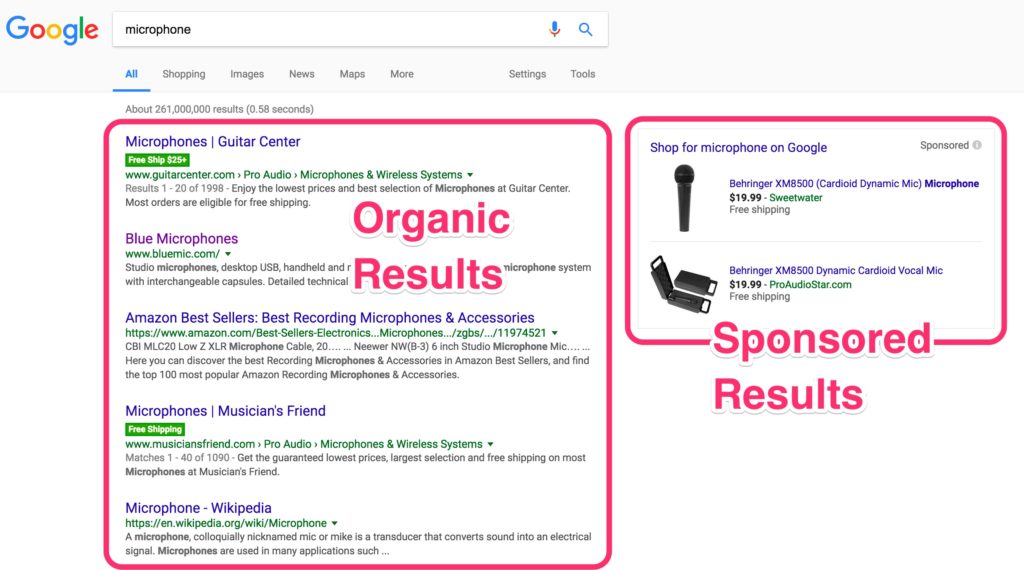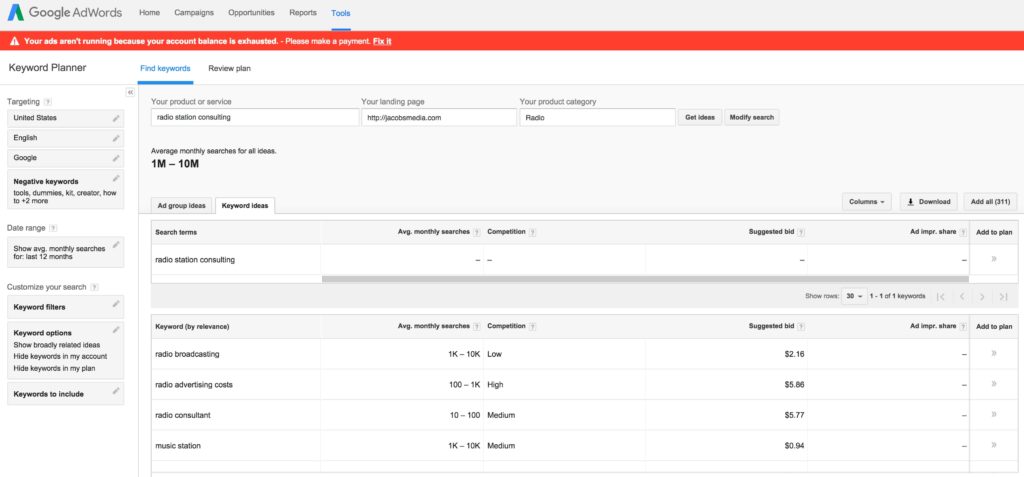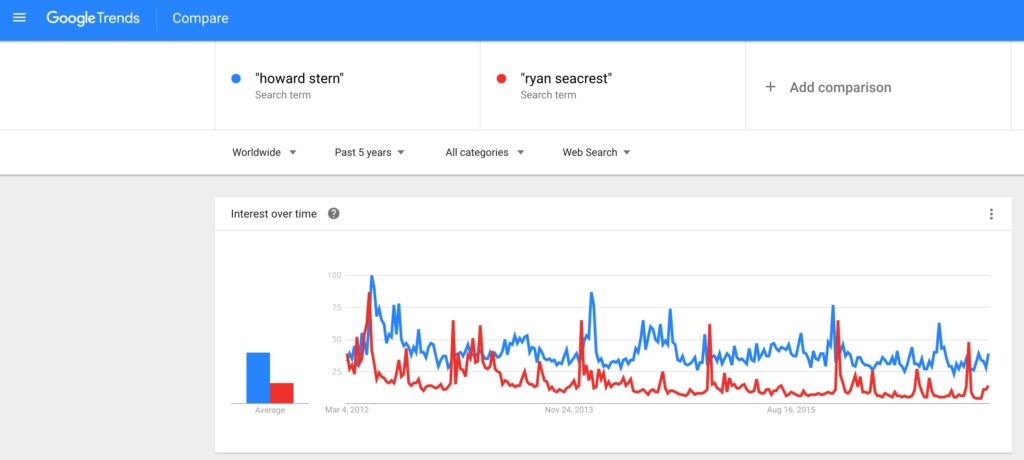 As radio broadcasters, we want to use Content Marketing as a framework for our digital strategy: We create content on our website, then share that content in places that our listeners will find it. For example, we might write a blogpost and share it on Facebook. Once people click on the link to that content and come back to the station’s website, we encourage them to take a specific action, such as enter a contest or sign up for our email club.
As radio broadcasters, we want to use Content Marketing as a framework for our digital strategy: We create content on our website, then share that content in places that our listeners will find it. For example, we might write a blogpost and share it on Facebook. Once people click on the link to that content and come back to the station’s website, we encourage them to take a specific action, such as enter a contest or sign up for our email club.
Radio broadcasters tend to focus on social media when trying to drive traffic to their website, but there’s another channel that should not be ignored: search engines. Just as your listeners probably visit Facebook on a regular basis, they also frequent sites like Google, Yahoo!, and Bing. Don’t ignore the power of Search Engine Optimization.
What is Search Engine Optimization?
“Search Engine Optimization,” or “SEO,” is simply the art of getting your content to show up in the results of search engines like Google so that more people visit your site. If you’ve ever searched for something in Google, you know that the search engine produces both organic (unpaid) results and sponsored (paid) results. When we refer to SEO, we are talking about getting your station’s website to show up in the organic results.

You may also hear the term “Search Engine Marketing” (SEM). SEM is an umbrella term that includes SEO under it. SEM also includes other tactics, such as Pay-Per-Click (PPC) advertising. PPC advertising is what gets your station into the sponsored search engine results.
Why Does SEO Matter for Radio?
When I first started at Jacobs Media, I worked with a radio station that hosts a huge annual concert. The name of the concert is not the same as the name of the radio station. By looking at their Google Analytics reports, we could see that on the day that the radio station announced the lineup for their concert, their website traffic shot through the roof. We discovered that the increase in traffic was coming from Google.
What were these people typing into Google that was bringing them to the station’s site? Google Analytics told us that they were typing in the name of the concert. In other words, people heard the concert announcement on the radio, then went to Google to search for the concert so they could get more information.
Unfortunately, the radio station had not optimized their website for search engines, so the blurb in the Google result displayed the incorrect date for the concert and listed a band that wasn’t playing that year. Moreover, the link that Google was directing people to was not the correct page on the station’s website. Listeners may not have found the concert information they were looking for. This could have negatively impacted the number of people who came to the concert. Concert attendance, of course, can have a big impact on ticket and sponsorship sales.
This is just one example of how SEO can affect a radio station’s bottom line. Your radio station should take the same care with search engines that it does with social media; both can drive an enormous amount of traffic to your station’s website when used properly.
How Does SEO Work?
Search engines like Google want people to find what they’re looking for. If a Google user doesn’t find what they’re looking for, they’ll stop using the site and go to a different search engine instead. So Google has a vested interest in making sure that it puts the most relevant content at the top of its results.
Google uses an algorithm to do this. That algorithm is a closely guarded secret, much like the formula for Coca-Cola. Google also tweaks that algorithm from time to time. So rather than try to game Google’s algorithm, your best bet is simply to create compelling content that people will search for. The more high quality content you create, the more web traffic that search engines like Google will send your way.
If you create content that isn’t very good, Google won’t want to put it at the top of its search results. Google looks for signals that the content it puts atop its search results or both relevant and high quality.
There are some basic steps you can take to make it easier for Google to figure out that your content is both relevant and high quality. I’ll discuss those next week.
Keywords
When people go to a search engine, they type a word or phrase into the search box. These are called the “keywords.” As your radio station maps out an SEO strategy, the first important question is, “What are people typing in when they’re looking for our content?” In other words, what are the keywords for your radio station’s website?
Different pages on your website may have different keywords. For example, while your call letters may be a keyword for the entire site, the word “Weezer” may only be a keyword for some pages. The listener who does a Google search for “WKRP morning show” is looking for something different than the listener who types in “WKRP Weezer acoustic performance.” Note that you’re not just using SEO to send people to your website’s homepage; sometimes you’re using it to send people to a specific page within the site. Every time you create a piece of content for your website, ask yourself, “What would people type into Google if they were looking for this?”
Take some time to brainstorm some of the keywords people might type in when looking for your radio station’s website. They may include words like:
- The station’s call letters
- The station’s format or music genres
- The name of the morning show or on-air personalities
- The names of syndicated programming or specialty shows
- The names of benchmark features
- The names of signature events, concerts, or contests
- The names of core artists
- Words like “concerts,” “interviews,” or “playlist”
Keyword Tools
There are a number of tools that you can use to help you figure out what your keywords are. Here are two from Google that you should know:
-
- Google Adwords Keyword Planner Tool: Google provides a tool to help you see how different keywords might drive traffic back to your site. Google provides this tool for free because they hope that you’ll eventually decide to spend money on sponsored search results, too. To use Google’s Keyword Planner Tool, you will need to set up an Adwords account (but you don’t have to spend any money). Then, answer some questions about who you are targeting, and Google will return a list of suggestions.Here, I’ve used the tool to find out what keywords English-speaking people in North America might type in when searching for a “radio broadcasting consultant.” As you can see, Google produced a list of related phrases, showing how many searches each term receives, how much competition there is for each term (how many people are bidding on that term in Adwords), and so on.

-
- Google Trends: Google Trends is a free tool that allows you to see how many searches a specific phrase receives. You can even compare different keywords. Here, I’ve compared the number of Google searches for “Howard Stern” to the number of searches for “Ryan Seacrest.”

Long-Tail Keywords
When I first moved to the Detroit area, I had to find a new dentist. I didn’t type “dentist” into Google. That would not have produced the results that I was looking for. I didn’t even type in “Detroit dentist.” Instead, I typed in “Clawson dentist,” because Clawson is the small Detroit suburb that I live in. When a phrase uses specific words to narrow the search, that’s called “long-tail keywords.” The name comes the classic marketing book, The Long Tail by Chris Anderson.
When people are looking for your radio station, they probably aren’t going to just type in “radio station.” They’re more likely to type in something like “Seattle alternative radio station.” Because long-tail keywords are more specific, they will produce more relevant search results. “WKRP morning show” and “WKRP Weezer performance” are both long-tail keywords, and will direct people to different pages on your site. Keep this in mind as you try to determine the keywords for different pages on your website.
There are a number of other resources that can help you determine the best keywords for your website content, and you can even hire companies to help you with this. Search Engine Optimization has grown into a cottage industry over the years. If your station is just getting started, however, you can use these free tools and some educated guesses to figure out what the keywords are for different pages on your website.
Once you know the phrases that people are typing into search engines when they’re looking for your content, you can optimize that content to so these search engines are more likely to include it in their results. This will drive more traffic to your site.
I’ll give you some actionable steps for optimizing your content in next week’s column. In the meantime, if you’d like help with your radio station’s digital strategy, please contact me.
More Digital Tips
- How to Declutter the Sub-Menus on Your Radio Station’s Website
- Rethinking Radio’s Concert Calendar Webpage for the Delta Variant
- You’re a Radio DJ. You’ve Lost Your Job. How to Take Control of Your Online Presence.
- How to Use Email Templates to Book Guests for Your Radio Show or Podcast
- Your Station’s Website Should Include These Two Types of Content
- A Simple Digital Treat to Thank Your Radio Listeners This Thanksgiving - November 13, 2023
- Interview Questions When Hiring Your Radio Station’s Next Digital Marketing Manager - November 6, 2023
- A Radio Conversation with ChatGPT: Part 2 – Promotions - October 30, 2023





Hi
SEO Link building is a process that requires a lot of time fo ik9.5f7.myftpupload.com
If you aren’t using SEO software then you will know the amount of work load involved in creating accounts, confirming emails and submitting your contents to thousands of websites in proper time and completely automated.
With THIS SOFTWARE the link submission process will be the easiest task and completely automated, you will be able to build unlimited number of links and increase traffic to your websites which will lead to a higher number of customers and much more sales for you.
With the best user interface ever, you just need to have simple software knowledge and you will easily be able to make your own SEO link building campaigns.
The best SEO software you will ever own, and we can confidently say that there is no other software on the market that can compete with such intelligent and fully automatic features.
The friendly user interface, smart tools and the simplicity of the tasks are making THIS SOFTWARE the best tool on the market.
IF YOU’RE INTERESTED, CONTACT ME ==> seosubmitter@mail.com
Regards,
Amparo
Epitome Corporation Pvt Ltd (ISO 9001:2015). Offered FREE
Test Service setup / Demo for the following service
for Small & Medium Business,Individuals,Corporate Users. Live Streaming,Video on Demand,
IP Camera Streaming,Transcoding,CDN,Protocol,Webcasting
Cloud Based Surveillance & Monitoring,Webinar Software,Streaming
Media Software,Web Conferencing Software,Virtual Classroom,Virtual
Online Training
Contact Us FREE Test Service Set Up – .Call Us: +91 8000504505 | +91
9227001005 Mail: contact@estv.in
Whats app +917574828203epitomesolutions.in
That is a good tip particularly tto those new to the blogosphere.
Short but very accurate information… Appreciate your sharing this one.
A must rewad article!